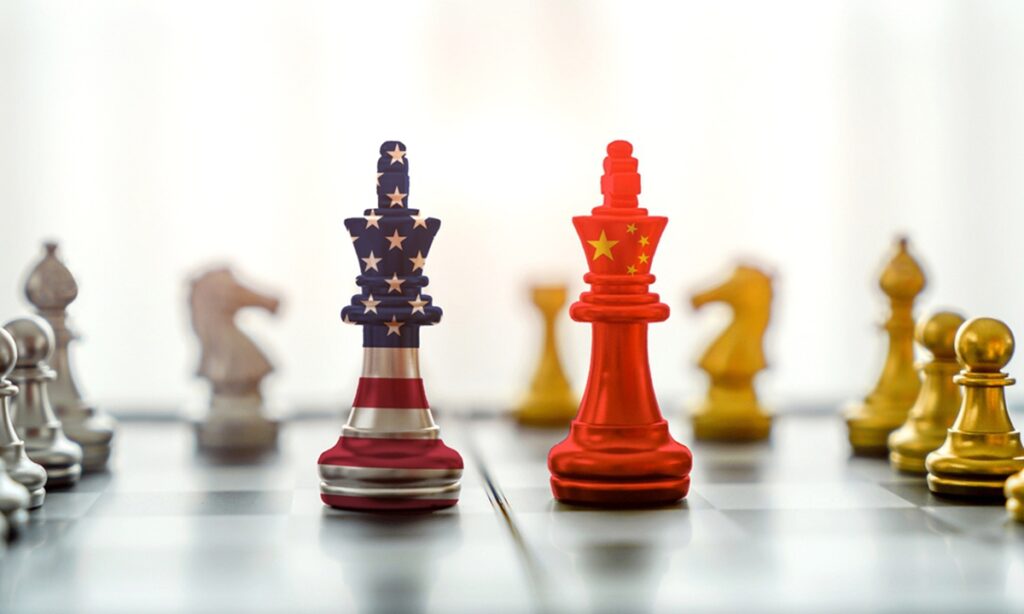With China and the US showing signs of resuming high-level engagement in recent days, highly anticipated meetings between the Chinese Commerce Minister Wang Wentao and his US counterparts on Thursday and Friday are widely seen as major barometers of whether it’s possible to “thaw” frosty ties between the two countries.
This is especially the case as the two sides, which have experienced deteriorating relations since the trade war in 2018, still share many common interests in trade and business that are considered a ballast for bilateral ties. Some Chinese observers believe that any progress in this practical field may help “thaw” tense relations.
However, there have been mixed signals from the US given that Washington’s overall China policy, which is focused on strategic rivalry and containment, has not changed. Meanwhile, Rick Waters, the State Department’s most senior official who created “China House”, is reportedly planning to step down, which also reflects the growing divergences within Washington on how to deal with the complex but crucially important US-China relations amid the influence of the presidential election cycle.
China’s commerce minister Wang will travel to the US and attend the 2023 APEC Ministers Responsible for Trade Meeting from Thursday to Friday, during which he will meet US Commerce Secretary Gina Raimondo and US Trade Representative Katherine Tai respectively, and hold exchanges on China-US trade relations and issues of mutual concern, Shu Jueting, spokesperson of the Chinese Ministry of Commerce, said on Thursday.
Some US media outlets, including the Wall Street Journal, said this is the latest sign of progress as the two countries seek to restore high-level exchanges, and a planned dinner for Thursday between Raimondo and Wang in Washington would be “a first barometer of the chances of success,” given it will be the first cabinet-level meeting in Washington between the two countries during the Biden administration’s term.
The overall deterioration in China-US relations began with the trade war in 2018, resulting in bilateral ties becoming embroiled in a highly tense situation. On top of that, the COVID-19 pandemic made Washington even more hysterical, Lü Xiang, research fellow with the Chinese Academy of Social Sciences, told the Global Times on Thursday. “If there is some progress in these sectors, which are known as practical ones, they could be the start of a ‘thaw’ in relations,” Lü said.
The meetings between senior Chinese and US officials came as China appointed Vice Foreign Minister Xie Feng as the new ambassador to the US, filling the Chinese ambassador position after it was left vacant for the longest period in four decades. Meanwhile, the two countries have seen a gradual resumption of high-level interactions in recent weeks, such as exchanges between China’s top diplomat Wang Yi and US National Security Advisor Jake Sullivan in Vienna and the meeting between Chinese State Councilor and Foreign Minister Qin Gang and US ambassador to China Nicholas Burns in Beijing in early May.
“Economic and trade relations still serve as a ballast in China-US relations. Smooth follow-up cooperation in these sectors could be seen as an important indication of an improvement in bilateral ties,” Li Haidong, a professor at the Institute of International Relations at the China Foreign Affairs University, told the Global Times on Thursday.
However, it could be a gradual process and we need more time to observe whether positive changes take place, Li noted.
Focus on high-tech, tariffs
Amid the US-led crackdown on China’s high-tech, especially the restrictions on the semiconductor industry, there have been growing voices inside the US industry warning that the US-China chip war risks “enormous damage” to American tech sector. The White House said on Wednesday that China’s recent move on US chipmaker Micron “won’t torpedo larger efforts to get US-China relations into a better position,” according to media reports.
“Chinese and US commerce officials are expected to talk about the supply chain and high-tech curbs. If the US takes one or two meaningful steps by easing tech curbs or lifting tariffs, it could be a positive sign for bilateral ties,” He Weiwen, a senior fellow at the Center for China and Globalization, told the Global Times on Thursday.
The expert also noted that there may not be any “fast progress,” and more efforts are needed to bring about any improvement.
Trade between China and the US hit a record high in 2022 despite political and diplomatic tensions, with imports and exports between the two countries reaching $690.6 billion, which is also widely seen as an important indication of the difficulties involved in decoupling, according to media reports.
“The current inflation in the US is still relatively high. If they lower tariffs [on Chinese products], it would be very positive news for its own consumers and macroeconomy,” Lü said, noting that even if the US makes adjustments in its trade and tech policies by considering its own interests, they could be positive factors for China-US relations.
Mixed signals
Although US President Joe Biden hinted at a thaw in relations, the US Congress – where lawmakers find rare bipartisan cause by calling China a threat and treating it with a hysterical mindset – continues to hype China-related issues.
For instance, a new US congressional committee on China approved reports on Wednesday pushing back at Beijing over its treatment of Uygurs and other ethnic minorities and seeking to deter the initiation of a conflict with Taiwan, hoping some of its recommendations become law this year.
Meanwhile, Waters, head of the US State Department’s Office of China Coordination, told a staff meeting on Wednesday that he plans to leave his post at the end of June, Bloomberg said. In February, the White House’s National Security Council announced the departure of senior director Laura Rosenberge.
Waters is widely seen as a US official who favors engaging with China, and also traveled to Beijing, Shanghai and Hong Kong in March, media reported.
Earlier this month, the State Department announced that Deputy Secretary of State Wendy Sherman, who has led much of the US’ diplomatic engagement with China, intends to retire, according to media report.
“The personnel changes in the ‘China House’ of the State Department, especially the sudden announcement of Sherman’s retirement, are clearly abnormal, which indicates that she must have been troubled by some issues within the department that she found intolerable,” Li said, noting it shows that since the balloon incident, there have been growing divergences within the White House’s China group.
There have been reports about the US State Department holding back export controls and human rights-related sanctions to try to limit damage to the US-China relationship after the US shot down a Chinese balloon in February.
The recent personnel adjustments in Washington indicate that the Biden administration is facing new challenges and political pressures in terms of what kind of China policy should be implemented and how to balance the increasingly diverse voices within the US, Zhu Feng, a professor of international relations at Nanjing University, told the Global Times on Thursday.
“It also shows that the policy of unilaterally pressuring China and attempting to impose a new Cold War on China-US relations is causing more debates within the US and the international community,” Zhu said.
(Global Times)




